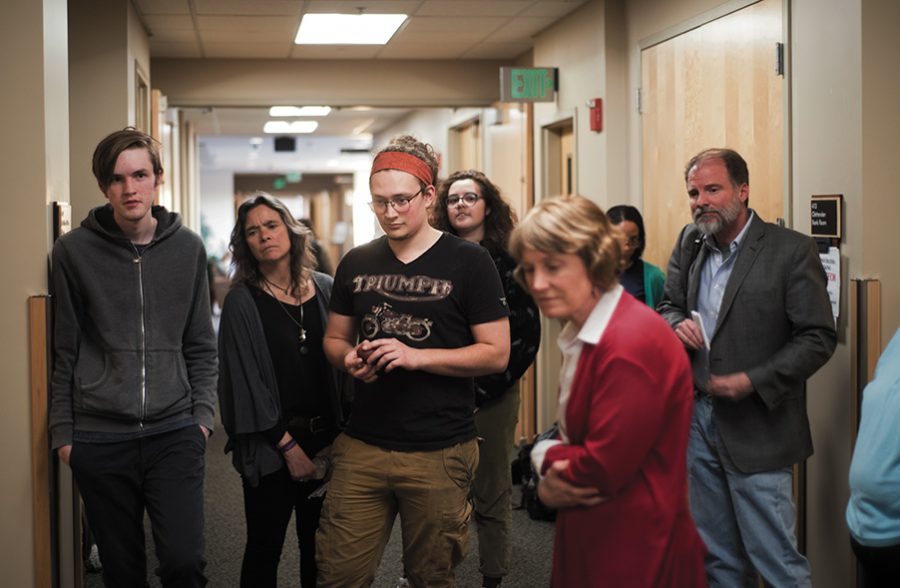Student’s hearings conclude conduct violation case
Protesters, including junior Alexander Smith and English professor Nancy Welch, listen to senior Scarlett Moore recount the events of the trial April 4. “I’m here because, number one, I think this is a really egregious attack on the free speech of queer students and students of color,” Moore said.
April 11, 2019
A group of students was found responsible for violating University policy following a Feb. 26 rally in Waterman, concluding a three-week conduct process.
The students spoke at a Feb. 26 NoNames for Justice rally that celebrated the one-year anniversary of the 2018 Waterman takeover, resulting in conduct proceedings for nine speakers.
Those found responsible received an official warning to not violate policy again, said sophomore Syd Ovitt, who was tried during the April 4 hearing. Not all of the nine were found responsible, she said.
“I’m relieved that it’s over but still angry,” Ovitt said. “It’s kind of traumatic, a little bit.”
Three students had their hearings April 1 and the rest had hearings April 4, leading to the April 5 decision, Ovitt said.
Thirty students and faculty waited for four hours outside the April 4 hearing to show their support, with English professor Nancy Welch buying pizza for the students in the meeting and waiting outside.
The two charges were: violating University policy and “public order/University order offense,” according to an April 5 letter obtained by the Cynic.
Annie Stevens, vice provost for student affairs, said it is her duty to maintain University policy.
“It is my goal professionally to support students in speaking out and their right to do that,” Stevens said. “That will be the balance ahead for all of us.”
Stevens declined to comment on the specifics of this decision, but respects the student conduct process, she said.
“The events of last year showed us that that’s a tricky space, because people were disrupted,” Stevens said.
Junior RiRi Stuart-Thompson, one of the students tried April 4, said although she does not like them and believes UVM’s practices need improvement, she understands the reasons for University policy.
An example Stuart-Thompson gave was how the documents the nine students were asked to sign admitting that they were responsible did not equally pertain to all of them, since they had different levels of involvement during the rally, she said.
The conduct process has increased the sense of mistrust activists have long felt with the administration, Stuart-Thompson said.
“The University has broken a lot of trust and communities,” she said. “That has been a big word: compromise. How can I compromise when the impact of this trial has hurt me so much that I can barely get out of bed?”
Stuart-Thompson believes that administrative transparency to include more students is important to beginning to heal, she said.
Sophomore Jordyn King, who was tried at the April 4 hearing, said this process has changed their perception of UVM and weighs on their decision as to whether they should transfer.
“It doesn’t feel like I have a place on this campus,” King said. “[This process] has dismantled all of the truths that I held about this University.”
The Center for Student Conduct declined to comment, citing student privacy concerns.







